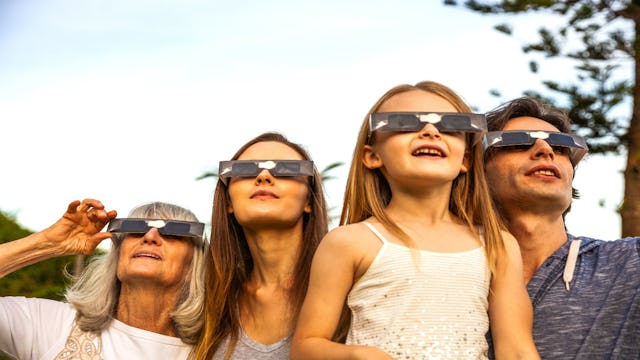Don't You Look At That Damn Eclipse Without Protective Eyewear

By this time, pretty much everyone knows that on Monday, August 21, at some time between 9:05 a.m. PDT and 1:16 p.m. EDT, depending on your geographical location, the sun will begin to darken. No, it’s not the harbinger of end times — it’s the Great American Solar Eclipse.
It’ll be a partial solar eclipse over all of mainland America, Canada, Mexico, Central America, and into northern South America.
But the Great American Solar Eclipse will be a rare total eclipse of the sun over a wide swath of the U.S. from Oregon to South Carolina. Most Americans live within a day’s drive of what’s called “the path of totality,” or what scientists are calling the aforementioned swath.
That creates one very, very big problem, aside from traffic jams. South Carolina, for example, is treating the event like a massive state of emergency, with the capital city area alone expecting over 300,000 visitors. There are no hotel rooms and no restaurant reservations to be had; authorities are recommending that locals stock up on essentials by the preceding mid-week.)
But that very, very big problem? The dumb-ass human factor. Everyone who’s ever watched The Magic School Bus knows you need special glasses to look at a solar eclipse, or you run the risk of serious eye damage — serious as in up to and including permanent blindness.
But many Americans aren’t taking this very serious shit very seriously. They’ve looked at the sun. They blinked and looked away. How bad could it be?
Dr. Christopher Quinn, president of the American Optometric Association, told Newsweek that the results can be bad, very bad. If your eyes are exposed to a lot of ultraviolet radiation in a short amount of time, you can get photokeratitis, or basically eye sunburn. Um, ouch.
Your eyes get all red and teary, and you feel like something’s stuck in them. Along with that, you have extreme light sensitivity. Without special glasses, looking right at the sun during a partial eclipse (or before and after the totality) can also cause solar retinopathy. This actually damages your retinas. And he says that there’s no time threshold for going blind; even looking for a few seconds can cause permanent damage.
So basically, you need special eclipse glasses. It is essential. Because no, stacking sunglasses will not work, nor will looking through a telescope or a camera lens.
The best place to check? Your local library. More than 2 million glasses are being given out by 7,000 libraries. Check here to see if yours is one of them. Science museums, or state museums, are another good bet for freebies (give a call first), and glasses retailer Warby Parker is giving out pairs for free at every one of their retail locations. NBC News also recommends checking local public health departments, astronomical societies, and any planetariums. And any NASA viewing site will be giving away glasses for free.
If you decide to buy your glasses, make sure you get them from an authorized retailer. Many companies are just slapping “AOA Approved” on glasses and putting them up on Amazon (I know because I bought some). The American Astronomical Association has a list of approved vendors that you can access here.
If you’re eager to do a project this week, you can also make your own solar viewer. The best way to do this is to make a pinhole camera, for which you’ll need “a box (a shoe box will work), a small piece of tinfoil, a sheet of white paper, tape, a pin or needle, and a box cutter or X-Acto knife.” National Geographic also has directions on making a very simple solar viewer and related science experiments for kids. It involves two pieces of white cardboard — and that’s it.
But whatever you do, don’t look directly at the sun until the totality. Once the sun is completely covered by the moon, it’s safe to look directly at it with the naked eye. But before and after that, you need eye protection. And no, a cloudy day doesn’t count. Let’s not have any hold-my-beer moments for this astronomical event, please. Because, you know, an eye sunburn sounds like freaking hell.
This article was originally published on